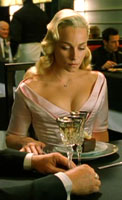 When Morpheus, Neo and Trinity speak with the Merovingian in M2, the Merovingian uses an orgasm-producing slice of cake to demonstrate his theory of causality, and then he says:
When Morpheus, Neo and Trinity speak with the Merovingian in M2, the Merovingian uses an orgasm-producing slice of cake to demonstrate his theory of causality, and then he says: When Morpheus, Neo and Trinity speak with the Merovingian in M2, the Merovingian uses an orgasm-producing slice of cake to demonstrate his theory of causality, and then he says:
When Morpheus, Neo and Trinity speak with the Merovingian in M2, the Merovingian uses an orgasm-producing slice of cake to demonstrate his theory of causality, and then he says:
Merovingian: We struggle against it, we fight to deny it, but it is of course pretense, it is a lie. Beneath our poised appearance, the truth is we are completely out of control. Causality. |
The Merovingian subtly jabs at Morpheus, Neo and Trinity when he says "poised appearance," implying that their belief in choice is nothing more than a phony surface appearance. This is the absolute last thing they want to believe, especially Morpheus and Neo. Remember back to the conversation in M1 between Morpheus and Thomas Anderson:
Morpheus: Do you believe in fate, Neo? Neo: No. Morpheus: Why not? Neo: Because I don't like the idea that I'm not in control of my life. Morpheus: I know exactly what you mean. |
In light of this conversation, the Merovingian couldn't have picked a more frustrating topic to welcome his guests with.
The realization that the Oracle is the Merovingian's replacement brings quite a bit more meaning to other things the Merovingian says. For example, the Merovingian cannot acknowledge that the Oracle's solution of choice is a legitimate thing - he thinks it is an illusion:
Merovingian: …there is only one constant, one universal, it is the only real truth: causality. Action. Reaction. Cause and effect. Morpheus: Everything begins with choice. Merovingian: No. Wrong. Choice is an illusion, created between those with power, and those without. |
There are three important components to the last thing the Merovingian says above: Choice is a created illusion, it is created by those with power, and it fools those without power.
Who created the "illusion" of choice? The Oracle. The whole system of choice within the Matrix is the Oracle's "stumbled-upon" solution. Who is the Merovingian talking about when he refers to "those with power"? The Oracle. She can see the future while the Merovingian cannot. Who are those without power? Humans. The Merovingian is talking to humans who don't even know why they came to see the Merovingian - they don't have "the power of why" and therefore have nothing to offer him.
So, the last sentence the Merovingian says above could be restated, "Choice is an illusion created by the Oracle to fool 99% of humans into being happy with their enslavement."
But the Merovingian is wrong: the Oracle didn't figure out how to create an illusion of choice. Quite the contrary - she found a way for the Matrix system to acknowledge the valid reality of human choice. The Oracle even tells Neo herself, "You've already made the choice. Now you must understand it." She acknowledges the reality of human choice, while the Merovingian does not.
And that is why the first two Matrix versions failed. They were built upon the simplistic assumption that human bodies are merely giant bags of chemicals that do nothing more than produce response to stimulus, sort of like giant amoebas. The Merovingian refuses to accept that these bags of chemicals exercise something called "free will." Instead, the Merovingian is a slave to the limiting idea of causality. For more on free will, see Other Theories: Free Will.
For the Merovingian, to say that humans are actually creating their own fate as they go along (making choices) puts them on a pedestal they do not deserve. Symbolically, it is no coincidence that Lucifer was jealous of the favor humans have with God.
"Stimulus and Response" or "Action and Reaction" can also be called (in the Merovingian's own words) "causality." What the Merovingian understands is true, from a machine point of view, because programs are able to predict what humans do. But the Merovingian arrives at this conclusion the wrong way - he thinks the Oracle merely understands all of the causes and effects of things that happen. He refuses to buy into the idea that humans are making choices, and therefore he also refuses to believe that the Oracle understands choices. It is an illusion, and the Merovingian thinks the Oracle merely understands causality better than the Merovingian does.
The Merovingian was created before the solution of “choice” was even pondered by any program. Naturally, it is not within the Merovingian’s programming to understand (much less accept) choice as a valid solution to the problem of predicting human response. This explains why he so bitterly and passionately argues against the “illusion of choice” with Morpheus. The Merovingian and Architect share the same outlook with regard to the Oracle because they are both outdated programs: the Oracle is just a liberal wacko program whos irrational way of thinking is repulsive.
Regardless, both the Oracle and Merovingian share a common goal: to understand the "why" behind human behavior. In M2, the Oracle tells Neo that he has already made a choice, and that he is meeting with her to try to understand why he made it. The Merovingian associates knowing "why" with having power, as we see when Neo, Morpheus and Trinity go to him without knowing why they need the Keymaker. If machines could completely understand the "why" behind all human behavior, it would a) allow machines to see infinitely far into the future, and b) allow machines to run a flawless Matrix system that never needs to be restarted.
| Back to Merovingian |
 Merovingian: Eyes of the Oracle |  Merovingian: Oracle's Punishment |